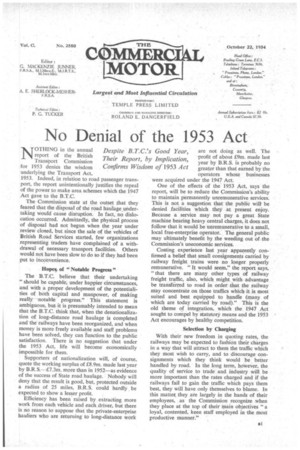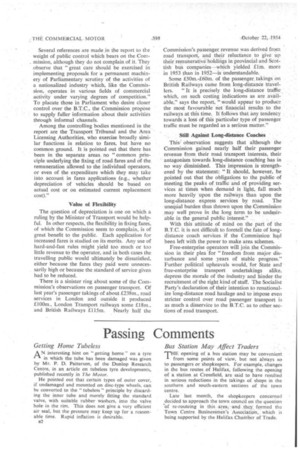No Denial of the 1953 Act
Page 35

Page 36

If you've noticed an error in this article please click here to report it so we can fix it.
NOTHING in the annual report of the British Transport Commission for 1953 denies the wisdom underlying the Transport Act, 1953. Indeed, in relation to road passenger transport, the report unintentionally justifies the repeal of the power to make area schemes which the 1947 Act gave to the B.T.C.
The Commission state at the outset that they feared that the disposal of the road haulage _undertaking would cause disruption. In fact, no dislocation occurred. Admittedly, the physical process of disposal had not begun when the year under review closed, but since the sale of the vehicles of British Road Services started, few organizations representing traders have complained of a withdrawal• of necessary transport facilities. Others would not have been slow to do so if they had been put to inconvenience.
Hopq, of "Notable Progress" The B.T.C. believe that their undertaking "should be capable, under happier circumstances, and with a proper development of the potentialities of both capital and manpower, of making really—notable progress." This statement is ambiguous, but it is presumably intended to mean that the B.T.C. think that, When the denationalization of long-distance road haulage is completed and the railways have been reorganized, and when money is more freely available and staff problems have been solved, they can function to the public satisfaction. There is no suggestion that under the 1953 Act, life will become economically _impossible for them.
Supporters of nationalization will, of course, quote the working surplus of 0.9m. made last year by 13.R.S.--£7.3m. more than in 1952—as evidence of the success of State road haulage. Nobody will deny that the result is good, but, protected outside a radius of 25 miles, B.R.S. could hardly, be expected to show a lesser profit.
Efficiency has been raised by extracting more work from each vehicle and each driver, but there is no reason to suppose that the private-enterprise hauliers who are returning to long-distance work are not doing as well. The profit of about Bin. made last year by B.R.S. is probably no greater than that earned by the operators whose businesses were acquired under the 1947 Act.
One of the effects of the 1953 Act, says the report, will be to reduce the Commission's ability to maintain permanently unremunerative services. This is not a suggestion that the public will be denied facilities which they at present enjoy. Because a service may not pay a great State machine bearing heavy central charges, it does not follow that it would be unremunerative to a small, local free-enterprise operator. The general public may ultimately benefit by the weeding out of the Commission's uneconomic services.
Costing experience last year apparently confirmed a belief that small consignments carried by railway freight trains were no longer properly remunerative. "It would seem," the report says, "that there are many other types of railway freight traffic, also, which might with advantage be transferred to road in order that the railway may concentrate on those traffics which it is most suited and best equipped to handle (many of which are today carried by road)." This is the old theme of integration, which the 1947 Act sought to compel by statutory means and the 1953 Act encourages by healthy competition.
Selection by Charging With their new freedom in quoting rates, the railways may be expected to fashion their charges in a way that will attract to them the traffic which they most wish to carry, and to discourage consignments which they think would be better handled by road. In the long term, however, the quality of service to trade and industry will be more important than the rates charged and if the railways fail to gain the traffic which pays them best, they will have only themselves to blame. In this matter, they are largely in the hands of their employees, as the Commission recognize when they place at the top of their main objectives "a loyal, contented, keen staff employed in the most productive manner." Several references are made in the report to the weight of public control which bears on the Commission, although they do not complain of it. They observe that "great care should be exercised in implementing proposals for a permanent machinery of Parliamentary scrutiny of the activities of a nationalized industry which, like the Commission, operates in various fields of commercial activity under varying degrees of competition." To placate those in Parliament who desire closer control over the B.T.C., the Commission propose to supply fuller information about their activities through informal channels.
Among the controlling bodies mentioned in the report are the Transport Tribunal and the Area Licensing Authorities, who exercise broadly similar functions in relation to fares, but have no common ground. It is pointed out that there has been in the separate areas. no "common principle underlying the fixing of road fares and of the. remuneration allowed to the individual operators, or even of the expenditure which they may take into account in fares applications (e.g., whether depreciation of vehicles should be based on actual cost or on estimated current replacement cost).
Value of Flexibility The question of depreciation is one on which a ruling by the Minister of Transport would be helpful. In other respects, the flexibility in fixing fares, of which the Commission seem to complain, is of great benefit to the public. Each application for increased fares is studied on its merits. Any use of hard-and-fast rules might yield too much or too little revenue to the operator, and in both cases the travelling public would ultimately be dissatisfied, either because the fares they paid were unnecessarily high or because the standard of service given had to be reduced.
There is a sinister ring about some of the Commission's observations on passenger transport. Of last year's passenger takings of about £238m., road services in London and outside it produced £100m., London Transport railways some £18m., and British Railways £115m. Nearly half the Commission's passenger revenue was derived from road transport, and their reluctance to give up their remunerative holdings in provincial and Scottish bus companies—which yielded £1m, more in 1953 than in 1952—is understandable.
Some £50m.-£60m. of the passenger takings on British Railways came from long-distance travel lers. " It is precisely the long-distance traffic , which, on such costing indications as are available," says the report, "would appear to produce the most favourable net financial results to the railways at this time It follows that any tendency towards a loss of this particular type of passenger traffic must be regarded as a serious matter."
Still Against Long-distance Coaches This, observation suggests that although the Commission gained nearly half their passenger revenue from their road transport interests, their antagonism towards long-distance coaching has in no way diminished. This impression is strengthened by the statement: "It should, however, be pointed out that the obligations to the public of meeting the peaks of traffic and of providing services at tithes when demand is light, fall much more heavily upon the railways than upon the long-distance express services by road. The unequal burden thus thrown upon the Commission may well prove in the long term to be undesirable in the general public interest."
With this attitude of mind on the part of the B.T.C. it is not difficult to foretell the fate of longdistance coach services if the Commission had been left with the power to make area schemes.
Free-enterprise operators will join the Commission in their plea for "freedom from major disturbance and some years of stable progress." Further political upheavals would, for State and free-enterprise transport undertakings alike, depress the morale of the industry and hinder the recruitment of the right kind of staff. The Socialist Party's declaration of their intention to renationalize long-distance road haulage and to impose even stricter control over road passenger transport is as much a disservice to the B.T.C. as to other sections of road transport.




































































































